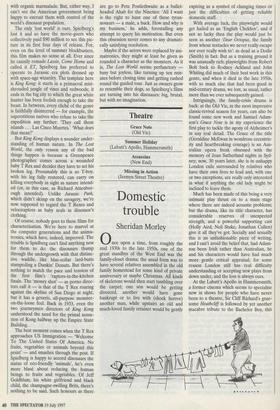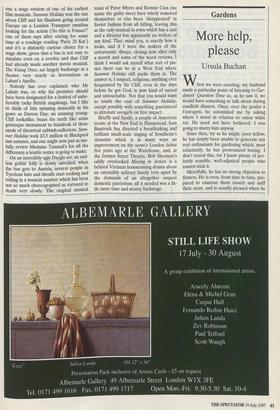Theatre
Grace Note (Old Vic) Summer Holiday (Labatt's Apollo, Hammersmith)
Assassins (New End)
Missing in Action (Jermyn Street Theatre)
Domestic trouble
Sheridan Morley
0 nce upon a time, from roughly the mid 1930s to the late 1950s, one of the great standbys of the West End was the family-closet drama; the usual form was to have several relatives assembled in the old family homestead for some kind of private anniversary or maybe Christmas. All kinds of skeletons would then start tumbling over the carpet; one son would be getting divorced, another would have gone bankrupt or to live with (shock horror) another man, while upstairs an old and much-loved family retainer would be gently expiring as a symbol of changing times or just the difficulties of getting reliable domestic staff.
With average luck, the playwright would get hailed as an 'English Chekhov', and if not so lucky then the play would just be seen as another 'Dear Octopus, the family from whose tentacles we never really escape nor ever really wish to': as dead as a Dodie (Smith) in fact. But as a training ground it was unusually rich; playwrights from Robert Bolt back to Rodney Ackland and John Whiting did much of their best work in this genre, and when it died in the late 1950s, with so much else that had been good in mid-century drama, we lost, as usual, rather more than we ever subsequently gained.
Intriguingly, the family-crisis drama is back: at the Old Vic, in the most impressive classic-revival season for years, can also be found some new work and Samuel Adam- son's Grace Note is in my experience the first play to tackle the agony of Alzheimer's in any real detail. The Grace of the title (Geraldine McEwan in wondrous eccentric- ity and heartbreaking courage) is an Aus- tralian opera freak obsessed with the memory of Joan Sutherland nights in Syd- ney; now, 30 years later, she is in unhappy London exile surrounded by relatives who have their own lives to lead and, with one or two exceptions, are really only interested in what if anything the old lady might be inclined to leave them.
Much has been made of this being a very intimate play thrust on to a main stage where there are indeed acoustic problems; but the drama, like its title character, has considerable reserves of unexpected strength, and a powerful supporting cast (Holly Aird, Neil Stuke, Jonathan Cullen) give it all they've got. Socially and sexually this is an unfashionable piece of writing, and I can't avoid the belief that, had Adam- son been Irish rather than Australian, he and his characters would have had much more• gentle critical appraisal; for some reason London still has real difficulty understanding or accepting new plays from down under, and the loss is always ours.
At the Labatt's Apollo in Hammersmith, a former cinema which seems to specialise now in shows for people who have never been to a theatre, Sir Cliff Richard's grue- some Heathcliff is followed by yet another macabre tribute to the Bachelor Boy, this one a stage version of one of his earliest film musicals. Summer Holiday was the one about Cliff and his Shadows going around Europe on a London Transport omnibus looking for the action (`So this is France?' one of them says after staring for some time at a roadsign reading 'Paris 20 Km') and it's a distinctly curious choice for a stage show, given that a bus is not easy to simulate even on a revolve and that Cliff had already made another movie musical, The Young Ones, set largely backstage in a theatre very nearly as horrendous as Labatt's Apollo. Nobody has ever explained who Mr Labatt was, or why his premises should have been designated for a festival of unbe- lievably tacky British singalongs, but I like to think of him spinning musically in his grave as Darren Day, an amazing young- Cliff lookalike, bears his teeth like some grotesque monument to hundreds of thou- sands of theatrical rubbish-collectors. Sum- mer Holiday took £3.5 million in Blackpool last summer, and one might now just as use- fully review Madame Tussaud's for all the difference a hostile notice is going to make. On an incredibly ugly Dayglo set, an end- less gothic folly is slowly unveiled; when the bus gets to Austria, several people in Tyrolean hats and dirndls start rocking and rolling in a musical number which has been not so much choreographed as tortured to death very slowly. The original musical team of Peter Myers and Ronnie Cass (we name the guilty men) have wisely removed themselves or else been 'disappeared' in Soviet fashion from all billing, leaving this as the only musical in town which has a cast and a director but apparently no writers of any kind. That, mind you, is exactly how it looks, and if I were the makers of the unfortunate Always, closing now after only a month and some of the worst reviews, I think I would ask myself what sort of jus- tice there can be in a West End where Summer Holiday still packs them in. The answer is, I suspect, religious; anything ever frequented by Sir Cliff, even in the days before he got God, is now kind of sacred and untouchable. Not that you would want to touch the cast of Summer Holiday, except possibly with something guaranteed to detonate savagely on first impact.
Briefly and finally, a couple of American treats; at the New End in Hampstead, Sam Buntrock has directed a breathtaking and brilliant small-scale staging of Sondheim's Assassins which is in many ways an improvement on the score's London debut five years ago at the Warehouse, and, at the Jermyn Street Theatre, Bob Sherman's oddly overlooked Missing in Action is a belated Vietnam homecoming drama about an ostensibly military family torn apart by the demands of an altogether suspect domestic patriotism; all it needed was a lit- tle more time and money backstage.



























































 Previous page
Previous page